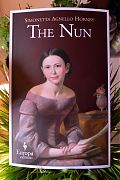
Simonetta Agnello Hornby
The Nun
Though I usually stay away from historical fiction, I enjoy the genre when it illuminates some period in Italian history. I didn’t pick up The Nun for only that reason, but also because it’s published by Europa Editions, one of my favorite imprints. The Nun is set in the Kingdom of the Two Sicilies in the 1830-40s, when the unification of Italy was hotly contended. It’s easy to forget, blinded by the history of Rome, that Italy as a nation is only 151 years old. Before 1861 it was divided into Papal States and nation-states. Each part had its own identity and language, as did each region within the Kingdom of the Two Sicilies, the largest part.
Agata’s coming of age story is set among political uncertainty. But as a marriageable young woman (i.e. the age of 13), Agata’s worries are elsewhere. When Agata’s father dies her mother is left with three girls to marry off, three dowries to pay out of money that isn’t there. Donna Gesuela, the mother, doesn’t sympathize with Agata’s love for a young man of a wealthy family. Gesuela has already paid four daughters’ dowries; when she was 13, she was unwillingly married to Agata’s father, a man over thirty years her senior. She spirits her two oldest unmarried daughters away from Messina to Naples.
The Padellani’s, Agata’s father’s family, are a respected and wealthy family of Naples, but they offer no financial assistance to the new widow. Donna Gesuela has no choice. She forces Agata into the convent of San Giorgio Stilita where her aunt is the abbess. Much of the rest of the book is set in that convent. Hornby writes the descriptions wonderfully, and brought me into the cloistered life of nuns, their solitude and their obsessions.
Agata refuses to relinquish herself to what she sees as a joyless existence trapped in a convent; she rebels; she reads novels sent to her by the captain James Garson, and newspapers. And then she doesn’t rebel as much and enjoys certain parts of the cloistered life. Years pass and she has formed an idea of the world through her solitude and vision of everything from a distance. When she is allowed out to see her family, she finds the people petty and the sounds and luxury overwhelming.
On either side of Agata are people plying at her for their own needs: the Cardinal, another relative, seems attracted to her and sadistically overprotective, while Gesuela seems intent on making Agata understand and accept the fate of being a woman, disappointed as she was in her own life. Though the following quote is about poverty, the reader can’t help to make the connection to Agata’s life:
She had read, and reading had sharpened her senses; it was through her senses that she now absorbed the unmistakable evidence of injustice.
Agata is another embodiment of the willful women of fiction who press their individuality on a world that isn’t ready for them.
· · · · · · · · · · · · · · · · · · · ·